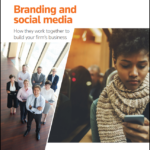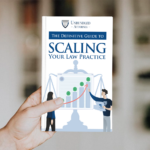
Law Firms Should Give Employees An Actual Choice About Returning To Offices
//
 It must be hard for law firm administrators to handle all of the decisions they need to make during the ongoing COVID-19 pandemic. Conditions keep changing as variants, vaccination availability, and other factors influence decisions about remote work and when offices will reopen. Due to the contagious nature of the omicron wave, many law firms stalled and then reversed reopening plans. Some law firms are taking a measured approach to reopening offices and are letting employees know that they should consider only returning to offices if they are comfortable. This flexibility is commendable, but law firms should give employees the genuine choice about when to return to work and should not use implied or explicit cues to force attorneys to return to offices notwithstanding such flexible policies.
It must be hard for law firm administrators to handle all of the decisions they need to make during the ongoing COVID-19 pandemic. Conditions keep changing as variants, vaccination availability, and other factors influence decisions about remote work and when offices will reopen. Due to the contagious nature of the omicron wave, many law firms stalled and then reversed reopening plans. Some law firms are taking a measured approach to reopening offices and are letting employees know that they should consider only returning to offices if they are comfortable. This flexibility is commendable, but law firms should give employees the genuine choice about when to return to work and should not use implied or explicit cues to force attorneys to return to offices notwithstanding such flexible policies.
Since starting my own practice almost three years ago, I do not have as much of a sense of what it is like to work at a larger law firm during the pandemic than I might have if I still worked for another firm. However, I also probably wouldn’t be able to write as openly as I do if I still worked as an associate at another law firm, so there’s that! Nevertheless, I talk regularly to numerous lawyers who do work at other law firms, and some are speaking about a strange situation that often occurs at law firms that purport to have flexible return-to-the-office policies.
googletag.cmd.push( function() { // Enable lazy loading. googletag.pubads().enableLazyLoad({ renderMarginPercent: 150, mobileScaling: 2 }); // Display ad. googletag.display( "div-id-for-top-300x250" ); googletag.enableServices(); });Numerous law firms tell employees that they can choose to stay at home or come to work as they see fit. Other workplaces have been telling employees that they would like people to be in the office, but employees do not need to come to the office if they would be uncomfortable doing so. Employers are essentially conveying that they are giving employees agency over their situation, which makes the most sense. It does not really make sense for employees to be forced to return to the office if they can be just as productive from home, and a flexible approach is the best way to handle all of the issues involving COVID-19 and the workplace.
 Sponsored A Faster Way To Perfect Your Legal Briefs These new tools can not only accomplish far more than the average human in far less time but also produce better, more reliable results. From Above the Law And Thomson Reuters
Sponsored A Faster Way To Perfect Your Legal Briefs These new tools can not only accomplish far more than the average human in far less time but also produce better, more reliable results. From Above the Law And Thomson Reuters Not surprisingly, many employees are choosing to stay home rather than return to work. It is just easier to complete work tasks and all of the personal things that individuals need to complete in the present environment by working from home than arbitrarily going into the office. Moreover, some employees need to spend hours on commutes to and from an office each day, so by eliminating this commuting time, individuals can devote more time to work and personal matters.
Some managers seem to be respecting the decisions of employees to stay at home and not return to the office. However, some managers are sending explicit, but more often than not implicit, cues that they would like employees to return to the office. In the current environment, an explicit requirement to return to the office is not good for PR and could potentially lead to liability if COVID-19 spreads at a shop, so managers seem to be using more subtle cues to compel employees back to the office.
googletag.cmd.push( function() { // Enable lazy loading. googletag.pubads().enableLazyLoad({ renderMarginPercent: 150, mobileScaling: 2 }); // Display ad. googletag.display( "div-id-for-middle-300x250" ); googletag.enableServices(); }); googletag.cmd.push( function() { // Enable lazy loading. googletag.pubads().enableLazyLoad({ renderMarginPercent: 150, mobileScaling: 2 }); // Display ad. googletag.display( "div-id-for-storycontent-440x100" ); googletag.enableServices(); }); googletag.cmd.push( function() { // Enable lazy loading. googletag.pubads().enableLazyLoad({ renderMarginPercent: 150, mobileScaling: 2 }); // Display ad. googletag.display( "div-id-for-in-story-youtube-1x1" ); googletag.enableServices(); });People I speak with tell me that if they do not return to the office for a while, especially if other people at a shop are voluntarily returning to work, they may receive a phone call from a manager. The manager may ask if there is any reason why the person does not feel comfortable returning to the office and if anything can be done to make that person more comfortable with going into an office. Although this may seem altruistic at first blush, such calls are likely more about pressuring employees back to the office rather than assuaging any concerns about returning to work. In fact, some managers seem to be more overt about suggesting that employees return to the office by conveying that many members of a team have returned to the office to suggest that an employee does not want to be in the minority of people working from home.
It is not beneath individuals in the legal industry to employ implicit employment tactics, as can be seen with stealth layoffs and other practices, and such tactics should be exposed for what they are. Law firm managers who do not want to deal with the bad PR of requiring employees to go back to offices are using pressure and other tactics to guilt or strongly suggest that people return to work. Such tactics should not be condoned, and law firm employees should have a bona fide choice about when they return to the office, especially if a law firm has an explicit flexible return-to-the-office policy. Everyone has their own unique situation, and law firm managers should not use implied pressure or other tactics to compel people back to offices.
Sponsored Sponsored How Branding And Social Media Can Build Your Firm’s Business Download this free eBook from our friends at Thomson Reuters, and learn to use social media to win new clients. From Above the Law and Thomson Reuters
Sponsored How Branding And Social Media Can Build Your Firm’s Business Download this free eBook from our friends at Thomson Reuters, and learn to use social media to win new clients. From Above the Law and Thomson Reuters  Sponsored Are You An Associate In-House Counsel Interested In Working At Dynamic Investment Company? Position is based in Dallas, Texas. From Kinney Recruiting
Sponsored Are You An Associate In-House Counsel Interested In Working At Dynamic Investment Company? Position is based in Dallas, Texas. From Kinney Recruiting  Sponsored The Definitive Guide To Scaling Your Law Firm Your Step-by-Step Roadmap for Making 2022 Your Best Year Ever. From Unbundled Attorney and Above The Law
Sponsored The Definitive Guide To Scaling Your Law Firm Your Step-by-Step Roadmap for Making 2022 Your Best Year Ever. From Unbundled Attorney and Above The Law  Sponsored Are You An Associate In-House Counsel Interested In Working At Dynamic Investment Company? Position is based in Dallas, Texas. From Kinney Recruiting
Sponsored Are You An Associate In-House Counsel Interested In Working At Dynamic Investment Company? Position is based in Dallas, Texas. From Kinney Recruiting  Jordan Rothman is a partner of The Rothman Law Firm, a full-service New York and New Jersey law firm. He is also the founder of Student Debt Diaries, a website discussing how he paid off his student loans. You can reach Jordan through email at [email protected].
Jordan Rothman is a partner of The Rothman Law Firm, a full-service New York and New Jersey law firm. He is also the founder of Student Debt Diaries, a website discussing how he paid off his student loans. You can reach Jordan through email at [email protected].
 Sponsored A Faster Way To Perfect Your Legal Briefs These new tools can not only accomplish far more than the average human in far less time but also produce better, more reliable results. From Above the Law And Thomson Reuters
Sponsored A Faster Way To Perfect Your Legal Briefs These new tools can not only accomplish far more than the average human in far less time but also produce better, more reliable results. From Above the Law And Thomson Reuters  Sponsored A Complete Guide To Managing Your Trust Account This free report will help you say goodbye to IOLTA angst. From LawPay and Above The Law Topics
Sponsored A Complete Guide To Managing Your Trust Account This free report will help you say goodbye to IOLTA angst. From LawPay and Above The Law Topics COVID-19, Jordan Rothman, Small Law Firms
Introducing Jobbguru: Your Gateway to Career Success
The ultimate job platform is designed to connect job seekers with their dream career opportunities. Whether you're a recent graduate, a seasoned professional, or someone seeking a career change, Jobbguru provides you with the tools and resources to navigate the job market with ease.
Take the next step in your career with Jobbguru:
Don't let the perfect job opportunity pass you by. Join Jobbguru today and unlock a world of career possibilities. Start your journey towards professional success and discover your dream job with Jobbguru.
Originally posted on: https://abovethelaw.com/2022/02/law-firms-should-give-employees-an-actual-choice-about-returning-to-offices/